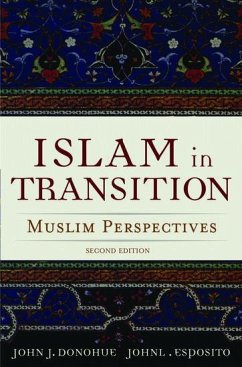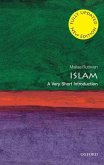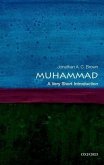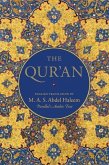John J. Donohue / John L. Esposito (eds.)Muslim Perspectives
Islam in Transition
Muslim Perspectives
Herausgegeben von Donohue, John J.; Esposito, John L.
John J. Donohue / John L. Esposito (eds.)Muslim Perspectives
Islam in Transition
Muslim Perspectives
Herausgegeben von Donohue, John J.; Esposito, John L.
- Broschiertes Buch
- Merkliste
- Auf die Merkliste
- Bewerten Bewerten
- Teilen
- Produkt teilen
- Produkterinnerung
- Produkterinnerung
9/11 and continued acts of global terrorism from Madrid to Bali have challenged the understanding of academic experts, students, and policymakers, Muslims and non-Muslims alike. Critical questions have been raised about Islam and Muslim politics in the modern world: Are Islam and modernity compatible?; Is Islam compatible with modernization: with nationalism, secularism, economic development and democracy?; Is Islam in need of and capable of reform?; what does Islam and what do Muslims have to say about globalization, democracy, human rights, women, jihad, violence, terrorism, and suicide…mehr
Andere Kunden interessierten sich auch für
![Islam Islam]() Malise Ruthven (University of Aberdeen)Islam17,99 €
Malise Ruthven (University of Aberdeen)Islam17,99 €![Muhammad Muhammad]() Jonathan A.C. Brown (Assistant Professor of Arabic and Islamic StudMuhammad17,99 €
Jonathan A.C. Brown (Assistant Professor of Arabic and Islamic StudMuhammad17,99 €![The Qur'an The Qur'an]() M A S Abdel HaleemThe Qur'an30,99 €
M A S Abdel HaleemThe Qur'an30,99 €![Islamic History Islamic History]() Adam J. Silverstein (Senior Lecturer in Jewish Studies and the AbraIslamic History17,99 €
Adam J. Silverstein (Senior Lecturer in Jewish Studies and the AbraIslamic History17,99 €![The Oxford Dictionary of Islam The Oxford Dictionary of Islam]() John L. Esposito (ed.)The Oxford Dictionary of Islam24,99 €
John L. Esposito (ed.)The Oxford Dictionary of Islam24,99 €![Angels Angels]() David Albert Jones (Director, The Anscombe Bioethics Centre, OxfordAngels17,99 €
David Albert Jones (Director, The Anscombe Bioethics Centre, OxfordAngels17,99 €![How We Live Is How We Die How We Live Is How We Die]() Pema ChodronHow We Live Is How We Die30,99 €
Pema ChodronHow We Live Is How We Die30,99 €-
-
-
9/11 and continued acts of global terrorism from Madrid to Bali have challenged the understanding of academic experts, students, and policymakers, Muslims and non-Muslims alike. Critical questions have been raised about Islam and Muslim politics in the modern world: Are Islam and modernity compatible?; Is Islam compatible with modernization: with nationalism, secularism, economic development and democracy?; Is Islam in need of and capable of reform?; what does Islam and what do
Muslims have to say about globalization, democracy, human rights, women, jihad, violence, terrorism, and suicide bombing. This updated and expanded second edition of Islam in Transition: Muslim Perspectives includes more than 50% new materials with representative selections from diverse Muslim voices,
moderates and extremists, traditionalists and reformers, from the Middle East to Southeast Asia, Europe to America.
Hinweis: Dieser Artikel kann nur an eine deutsche Lieferadresse ausgeliefert werden.
Muslims have to say about globalization, democracy, human rights, women, jihad, violence, terrorism, and suicide bombing. This updated and expanded second edition of Islam in Transition: Muslim Perspectives includes more than 50% new materials with representative selections from diverse Muslim voices,
moderates and extremists, traditionalists and reformers, from the Middle East to Southeast Asia, Europe to America.
Hinweis: Dieser Artikel kann nur an eine deutsche Lieferadresse ausgeliefert werden.
Produktdetails
- Produktdetails
- Verlag: Oxford University Press
- 2nd ed.
- Seitenzahl: 528
- Erscheinungstermin: 9. März 2006
- Englisch
- Abmessung: 234mm x 156mm x 32mm
- Gewicht: 730g
- ISBN-13: 9780195174311
- ISBN-10: 0195174313
- Artikelnr.: 20782089
- Herstellerkennzeichnung
- Libri GmbH
- Europaallee 1
- 36244 Bad Hersfeld
- gpsr@libri.de
- Verlag: Oxford University Press
- 2nd ed.
- Seitenzahl: 528
- Erscheinungstermin: 9. März 2006
- Englisch
- Abmessung: 234mm x 156mm x 32mm
- Gewicht: 730g
- ISBN-13: 9780195174311
- ISBN-10: 0195174313
- Artikelnr.: 20782089
- Herstellerkennzeichnung
- Libri GmbH
- Europaallee 1
- 36244 Bad Hersfeld
- gpsr@libri.de
Edited by John J. Donohue, Director of the Center for the Study of the Modern Arab World, St. Joseph's University, Beirut and John L. Esposito, University Professor of Religion and International Affairs and Founding Director of the Center for Muslim-Christian Understanding, Georgetown University
=New to this edition
Introduction
I. Early Responses: Crisis and the Search for Identity
Rifaa Badawi Rafi al-Tahtawi: Fatherland and Patriotism
Sayyid Jamal al-Din al-Afghani: An Islamic Response to Imperialism; Islamic Solidarity
Shaykh Muhammad Abduh: Islam, Reason, and Civilization
Sir Sayyid Ahmad Khan: India and English Government; Islam: The Religion of Reason and Nature
II. Islam and the Modern State
Islam and Nationalism
Rashid Rida: Patriotism, Nationalism, and Group Spirit in Islam
Amir Shakib-Arslan: Our Decline and Its Causes
Taha Husayn: The Future of Culture in Egypt
Hasan al-Banna: The New Renaissance
Abd al-Rahman al-Bazzaz: Islam and Arab Nationalism
Muhammad Iqbal: A Separate Muslim State in the Subcontinent
Abu-l-Ala Mawdudi: Nationalism and Islam
Islam and Socialism
Shaykh Mahmud Shaltut: Socialism and Islam
Muammar al-Qadhdhafi: The Third Way
Michel Aflaq: The Arab Personality: Between Past and Present
Mustafa Sibai: Islamic Socialism
Sayid Qutb: Social Justice in Islam
The Algerian National Charter: Islam and the Socialist Revolution
A.K. Brohi: The Concept of Islamic Socialism
Islam in the Contemporary Secular State
Ali Abd al-Raziq: The Caliphate and the Bases of Power
Hichem Djait: Islam, Reform, and the New Arab Man
Mustafa Mahmud: Islam vs. Marxism and Capitalism
Mushie ul-Haq: Islam in Secular India
Asghar Ali Engineer: Islam and Secularism
III. Islam and Social Change
The Modernization of Islamic Law
Subhi Mahmasani: Adaptation of Islamic Jurisprudence to Modern Social Needs
Asaf A.A. Fyzee: The Reinterpretation of Islam
The Debate over Family Law Reform in Pakistan
Amina Wadud: Rights and Roles of Women
Ahmed Zaki Yamani: The Political Competence of Women
M. Ashmawi: Reforming Islam and Islamic Law
Heba Rouf-Ezzat: On the Future of Women and Politics in the Arab World
Sisters in Islam: Chronology of a Struggle for Equal Rights
Fatwas: The Veil/Hijab
Bio-ethics/Family Planning
Islam and Economics
Ayatullah Mahmud Taliqani: The Characteristics of Islamic Economics
Khurshid Ahmad: Islam and the Challenge of Economic Development
M. Umar Chapra: The Islamic Welfare State
M. Baqr al-Sadr: The Psychological Role of Islam in Economic Development
IV. Islam and Contemporary Issues
Islam and Democracy
Abu-l-Ala Mawdudi: Political Theory of Islam
Raschid Ghannoushi: Islamists' Participation in a non-Islamic Government
Mohammed Selim al-Awa: Political Pluralism: An Islamic Perspective
Murad Hofmann: Democracy or Shuracracy
Abdul Aziz Sachedina: Why Democracy, and Why Now?
Abdel Karim Soroush: Tolerance and Governance
Abid Ullah Jan: Neither Required nor an Issue
Islam and the West: Clash and Dialogue
Anwar Ibrahim: The Need for Civlizational Dialogue
Anwar Ibrahim: The Need for Civilizational Dialogue
M. Shahrour: Islamic Culture in Danger
Ali Shariati: Religion and Protest
Mohammed Khatami: Dialogue between East and West
Seyyed Hossein Nasr: Reflections Upon Islam and the West
T.J. Winter: The Poverty of Fanaticism
Jihad Defined and Redefined
Sherman Jackson: Jihad in the Modern World
Sayyid Qutb: Jihad in the Cause of God
Farag: The Forgotten Duty
Abudllah Al-Azzam: Caravan: Global Jihad
Osama Bin Laden: Neo-Jihad or Global Jihad
HAMAS: The Covenant of the Islamic Resistance Movement
Shams al-Din: On the Political Unity of Using Armed Violence
Shaykh Muhammed Fadlallah: We must think before we act; September 11 was a gift to the U.S. administration
Khaled Abou El Fadl: Islam and Violence: Our Forgotten Legacy
Fatwas: Jihad, Suicide Bombing, and Martyrdom
Global Voices: Issues of Identity
Mustafa Ceric: The Many Voices of Islam: Cultivating Intellectual Pluralism
Tariq Ramadan: The Arab World and the Muslims Faced with their Contradictions
Osman Bakar: Islam and the Malay Civilizational Identity: Tension and Harmony between Ethnicity and Religiosity
Nurcholish Madjid: Islamic Faith and the Problem of Pluralism: Relations among the Believers
Muqtedar Khan: Reason and Individual Reasoning (Ijtihad)
Ali Mazrui: Human History as Divine Revelation: A Dialogue
Introduction
I. Early Responses: Crisis and the Search for Identity
Rifaa Badawi Rafi al-Tahtawi: Fatherland and Patriotism
Sayyid Jamal al-Din al-Afghani: An Islamic Response to Imperialism; Islamic Solidarity
Shaykh Muhammad Abduh: Islam, Reason, and Civilization
Sir Sayyid Ahmad Khan: India and English Government; Islam: The Religion of Reason and Nature
II. Islam and the Modern State
Islam and Nationalism
Rashid Rida: Patriotism, Nationalism, and Group Spirit in Islam
Amir Shakib-Arslan: Our Decline and Its Causes
Taha Husayn: The Future of Culture in Egypt
Hasan al-Banna: The New Renaissance
Abd al-Rahman al-Bazzaz: Islam and Arab Nationalism
Muhammad Iqbal: A Separate Muslim State in the Subcontinent
Abu-l-Ala Mawdudi: Nationalism and Islam
Islam and Socialism
Shaykh Mahmud Shaltut: Socialism and Islam
Muammar al-Qadhdhafi: The Third Way
Michel Aflaq: The Arab Personality: Between Past and Present
Mustafa Sibai: Islamic Socialism
Sayid Qutb: Social Justice in Islam
The Algerian National Charter: Islam and the Socialist Revolution
A.K. Brohi: The Concept of Islamic Socialism
Islam in the Contemporary Secular State
Ali Abd al-Raziq: The Caliphate and the Bases of Power
Hichem Djait: Islam, Reform, and the New Arab Man
Mustafa Mahmud: Islam vs. Marxism and Capitalism
Mushie ul-Haq: Islam in Secular India
Asghar Ali Engineer: Islam and Secularism
III. Islam and Social Change
The Modernization of Islamic Law
Subhi Mahmasani: Adaptation of Islamic Jurisprudence to Modern Social Needs
Asaf A.A. Fyzee: The Reinterpretation of Islam
The Debate over Family Law Reform in Pakistan
Amina Wadud: Rights and Roles of Women
Ahmed Zaki Yamani: The Political Competence of Women
M. Ashmawi: Reforming Islam and Islamic Law
Heba Rouf-Ezzat: On the Future of Women and Politics in the Arab World
Sisters in Islam: Chronology of a Struggle for Equal Rights
Fatwas: The Veil/Hijab
Bio-ethics/Family Planning
Islam and Economics
Ayatullah Mahmud Taliqani: The Characteristics of Islamic Economics
Khurshid Ahmad: Islam and the Challenge of Economic Development
M. Umar Chapra: The Islamic Welfare State
M. Baqr al-Sadr: The Psychological Role of Islam in Economic Development
IV. Islam and Contemporary Issues
Islam and Democracy
Abu-l-Ala Mawdudi: Political Theory of Islam
Raschid Ghannoushi: Islamists' Participation in a non-Islamic Government
Mohammed Selim al-Awa: Political Pluralism: An Islamic Perspective
Murad Hofmann: Democracy or Shuracracy
Abdul Aziz Sachedina: Why Democracy, and Why Now?
Abdel Karim Soroush: Tolerance and Governance
Abid Ullah Jan: Neither Required nor an Issue
Islam and the West: Clash and Dialogue
Anwar Ibrahim: The Need for Civlizational Dialogue
Anwar Ibrahim: The Need for Civilizational Dialogue
M. Shahrour: Islamic Culture in Danger
Ali Shariati: Religion and Protest
Mohammed Khatami: Dialogue between East and West
Seyyed Hossein Nasr: Reflections Upon Islam and the West
T.J. Winter: The Poverty of Fanaticism
Jihad Defined and Redefined
Sherman Jackson: Jihad in the Modern World
Sayyid Qutb: Jihad in the Cause of God
Farag: The Forgotten Duty
Abudllah Al-Azzam: Caravan: Global Jihad
Osama Bin Laden: Neo-Jihad or Global Jihad
HAMAS: The Covenant of the Islamic Resistance Movement
Shams al-Din: On the Political Unity of Using Armed Violence
Shaykh Muhammed Fadlallah: We must think before we act; September 11 was a gift to the U.S. administration
Khaled Abou El Fadl: Islam and Violence: Our Forgotten Legacy
Fatwas: Jihad, Suicide Bombing, and Martyrdom
Global Voices: Issues of Identity
Mustafa Ceric: The Many Voices of Islam: Cultivating Intellectual Pluralism
Tariq Ramadan: The Arab World and the Muslims Faced with their Contradictions
Osman Bakar: Islam and the Malay Civilizational Identity: Tension and Harmony between Ethnicity and Religiosity
Nurcholish Madjid: Islamic Faith and the Problem of Pluralism: Relations among the Believers
Muqtedar Khan: Reason and Individual Reasoning (Ijtihad)
Ali Mazrui: Human History as Divine Revelation: A Dialogue
=New to this edition
Introduction
I. Early Responses: Crisis and the Search for Identity
Rifaa Badawi Rafi al-Tahtawi: Fatherland and Patriotism
Sayyid Jamal al-Din al-Afghani: An Islamic Response to Imperialism; Islamic Solidarity
Shaykh Muhammad Abduh: Islam, Reason, and Civilization
Sir Sayyid Ahmad Khan: India and English Government; Islam: The Religion of Reason and Nature
II. Islam and the Modern State
Islam and Nationalism
Rashid Rida: Patriotism, Nationalism, and Group Spirit in Islam
Amir Shakib-Arslan: Our Decline and Its Causes
Taha Husayn: The Future of Culture in Egypt
Hasan al-Banna: The New Renaissance
Abd al-Rahman al-Bazzaz: Islam and Arab Nationalism
Muhammad Iqbal: A Separate Muslim State in the Subcontinent
Abu-l-Ala Mawdudi: Nationalism and Islam
Islam and Socialism
Shaykh Mahmud Shaltut: Socialism and Islam
Muammar al-Qadhdhafi: The Third Way
Michel Aflaq: The Arab Personality: Between Past and Present
Mustafa Sibai: Islamic Socialism
Sayid Qutb: Social Justice in Islam
The Algerian National Charter: Islam and the Socialist Revolution
A.K. Brohi: The Concept of Islamic Socialism
Islam in the Contemporary Secular State
Ali Abd al-Raziq: The Caliphate and the Bases of Power
Hichem Djait: Islam, Reform, and the New Arab Man
Mustafa Mahmud: Islam vs. Marxism and Capitalism
Mushie ul-Haq: Islam in Secular India
Asghar Ali Engineer: Islam and Secularism
III. Islam and Social Change
The Modernization of Islamic Law
Subhi Mahmasani: Adaptation of Islamic Jurisprudence to Modern Social Needs
Asaf A.A. Fyzee: The Reinterpretation of Islam
The Debate over Family Law Reform in Pakistan
Amina Wadud: Rights and Roles of Women
Ahmed Zaki Yamani: The Political Competence of Women
M. Ashmawi: Reforming Islam and Islamic Law
Heba Rouf-Ezzat: On the Future of Women and Politics in the Arab World
Sisters in Islam: Chronology of a Struggle for Equal Rights
Fatwas: The Veil/Hijab
Bio-ethics/Family Planning
Islam and Economics
Ayatullah Mahmud Taliqani: The Characteristics of Islamic Economics
Khurshid Ahmad: Islam and the Challenge of Economic Development
M. Umar Chapra: The Islamic Welfare State
M. Baqr al-Sadr: The Psychological Role of Islam in Economic Development
IV. Islam and Contemporary Issues
Islam and Democracy
Abu-l-Ala Mawdudi: Political Theory of Islam
Raschid Ghannoushi: Islamists' Participation in a non-Islamic Government
Mohammed Selim al-Awa: Political Pluralism: An Islamic Perspective
Murad Hofmann: Democracy or Shuracracy
Abdul Aziz Sachedina: Why Democracy, and Why Now?
Abdel Karim Soroush: Tolerance and Governance
Abid Ullah Jan: Neither Required nor an Issue
Islam and the West: Clash and Dialogue
Anwar Ibrahim: The Need for Civlizational Dialogue
Anwar Ibrahim: The Need for Civilizational Dialogue
M. Shahrour: Islamic Culture in Danger
Ali Shariati: Religion and Protest
Mohammed Khatami: Dialogue between East and West
Seyyed Hossein Nasr: Reflections Upon Islam and the West
T.J. Winter: The Poverty of Fanaticism
Jihad Defined and Redefined
Sherman Jackson: Jihad in the Modern World
Sayyid Qutb: Jihad in the Cause of God
Farag: The Forgotten Duty
Abudllah Al-Azzam: Caravan: Global Jihad
Osama Bin Laden: Neo-Jihad or Global Jihad
HAMAS: The Covenant of the Islamic Resistance Movement
Shams al-Din: On the Political Unity of Using Armed Violence
Shaykh Muhammed Fadlallah: We must think before we act; September 11 was a gift to the U.S. administration
Khaled Abou El Fadl: Islam and Violence: Our Forgotten Legacy
Fatwas: Jihad, Suicide Bombing, and Martyrdom
Global Voices: Issues of Identity
Mustafa Ceric: The Many Voices of Islam: Cultivating Intellectual Pluralism
Tariq Ramadan: The Arab World and the Muslims Faced with their Contradictions
Osman Bakar: Islam and the Malay Civilizational Identity: Tension and Harmony between Ethnicity and Religiosity
Nurcholish Madjid: Islamic Faith and the Problem of Pluralism: Relations among the Believers
Muqtedar Khan: Reason and Individual Reasoning (Ijtihad)
Ali Mazrui: Human History as Divine Revelation: A Dialogue
Introduction
I. Early Responses: Crisis and the Search for Identity
Rifaa Badawi Rafi al-Tahtawi: Fatherland and Patriotism
Sayyid Jamal al-Din al-Afghani: An Islamic Response to Imperialism; Islamic Solidarity
Shaykh Muhammad Abduh: Islam, Reason, and Civilization
Sir Sayyid Ahmad Khan: India and English Government; Islam: The Religion of Reason and Nature
II. Islam and the Modern State
Islam and Nationalism
Rashid Rida: Patriotism, Nationalism, and Group Spirit in Islam
Amir Shakib-Arslan: Our Decline and Its Causes
Taha Husayn: The Future of Culture in Egypt
Hasan al-Banna: The New Renaissance
Abd al-Rahman al-Bazzaz: Islam and Arab Nationalism
Muhammad Iqbal: A Separate Muslim State in the Subcontinent
Abu-l-Ala Mawdudi: Nationalism and Islam
Islam and Socialism
Shaykh Mahmud Shaltut: Socialism and Islam
Muammar al-Qadhdhafi: The Third Way
Michel Aflaq: The Arab Personality: Between Past and Present
Mustafa Sibai: Islamic Socialism
Sayid Qutb: Social Justice in Islam
The Algerian National Charter: Islam and the Socialist Revolution
A.K. Brohi: The Concept of Islamic Socialism
Islam in the Contemporary Secular State
Ali Abd al-Raziq: The Caliphate and the Bases of Power
Hichem Djait: Islam, Reform, and the New Arab Man
Mustafa Mahmud: Islam vs. Marxism and Capitalism
Mushie ul-Haq: Islam in Secular India
Asghar Ali Engineer: Islam and Secularism
III. Islam and Social Change
The Modernization of Islamic Law
Subhi Mahmasani: Adaptation of Islamic Jurisprudence to Modern Social Needs
Asaf A.A. Fyzee: The Reinterpretation of Islam
The Debate over Family Law Reform in Pakistan
Amina Wadud: Rights and Roles of Women
Ahmed Zaki Yamani: The Political Competence of Women
M. Ashmawi: Reforming Islam and Islamic Law
Heba Rouf-Ezzat: On the Future of Women and Politics in the Arab World
Sisters in Islam: Chronology of a Struggle for Equal Rights
Fatwas: The Veil/Hijab
Bio-ethics/Family Planning
Islam and Economics
Ayatullah Mahmud Taliqani: The Characteristics of Islamic Economics
Khurshid Ahmad: Islam and the Challenge of Economic Development
M. Umar Chapra: The Islamic Welfare State
M. Baqr al-Sadr: The Psychological Role of Islam in Economic Development
IV. Islam and Contemporary Issues
Islam and Democracy
Abu-l-Ala Mawdudi: Political Theory of Islam
Raschid Ghannoushi: Islamists' Participation in a non-Islamic Government
Mohammed Selim al-Awa: Political Pluralism: An Islamic Perspective
Murad Hofmann: Democracy or Shuracracy
Abdul Aziz Sachedina: Why Democracy, and Why Now?
Abdel Karim Soroush: Tolerance and Governance
Abid Ullah Jan: Neither Required nor an Issue
Islam and the West: Clash and Dialogue
Anwar Ibrahim: The Need for Civlizational Dialogue
Anwar Ibrahim: The Need for Civilizational Dialogue
M. Shahrour: Islamic Culture in Danger
Ali Shariati: Religion and Protest
Mohammed Khatami: Dialogue between East and West
Seyyed Hossein Nasr: Reflections Upon Islam and the West
T.J. Winter: The Poverty of Fanaticism
Jihad Defined and Redefined
Sherman Jackson: Jihad in the Modern World
Sayyid Qutb: Jihad in the Cause of God
Farag: The Forgotten Duty
Abudllah Al-Azzam: Caravan: Global Jihad
Osama Bin Laden: Neo-Jihad or Global Jihad
HAMAS: The Covenant of the Islamic Resistance Movement
Shams al-Din: On the Political Unity of Using Armed Violence
Shaykh Muhammed Fadlallah: We must think before we act; September 11 was a gift to the U.S. administration
Khaled Abou El Fadl: Islam and Violence: Our Forgotten Legacy
Fatwas: Jihad, Suicide Bombing, and Martyrdom
Global Voices: Issues of Identity
Mustafa Ceric: The Many Voices of Islam: Cultivating Intellectual Pluralism
Tariq Ramadan: The Arab World and the Muslims Faced with their Contradictions
Osman Bakar: Islam and the Malay Civilizational Identity: Tension and Harmony between Ethnicity and Religiosity
Nurcholish Madjid: Islamic Faith and the Problem of Pluralism: Relations among the Believers
Muqtedar Khan: Reason and Individual Reasoning (Ijtihad)
Ali Mazrui: Human History as Divine Revelation: A Dialogue








